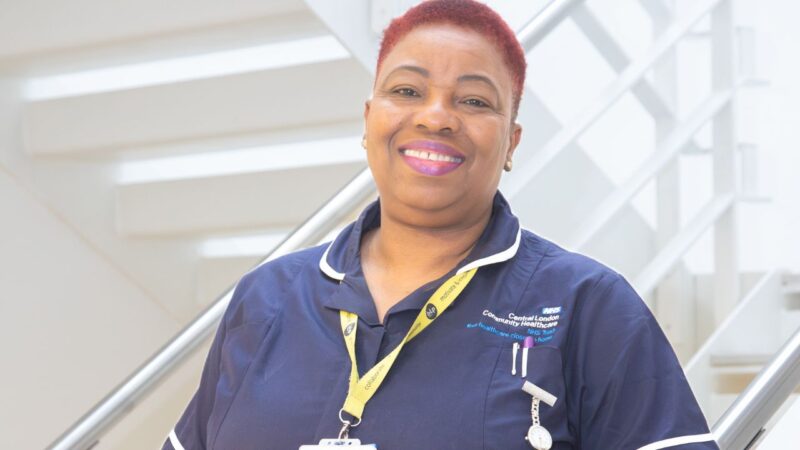Julie Itoje is a community matron, working in the Wandsworth complex care team for Central London Community Healthcare NHS Trust. Julie made a career switch from IT to nursing when her youngest child was little – after a friend picked up on her patience and compassion. She has never looked back, guided by an ethos of treating every patient in her care as if they were her mum.
This interview is part of a series, going behind the scenes to get to know the people who keep NHS services working – in winter and beyond.
Tell us about your role
As a community matron, my job is about supporting people with long-term conditions – maybe uncontrolled diabetes, heart failure, serious respiratory conditions or complex care needs – and case management of patients. I see housebound patients in their own homes, providing medical care, carrying out medication reviews, making sure they get winter vaccinations and that they have the right equipment, and preventing hospital admissions. The people in my caseload are referred by GPs, from different hospitals and by physios and district nurses. We work together as a team to help them.
What’s a typical day like?
I might see three people a day or as many as six. When I see someone new, I carry out an assessment to identify if they need other services – such as physio or a referral to the memory clinic. I might take bloods or manage their pain by reviewing their medication – I am a clinical prescriber. Back at the office we have management meetings, to discuss each case and decide if we need to follow up with GPs or social care.
What is your nursing story?
I was born in Nigeria. I got married young and came to this country. My first career was in IT – I was a computer analyst. I enjoyed it but after I had my youngest child I thought ‘I can’t do this anymore’. A friend, who was already a nurse, suggested I join her. She said, ‘you’re caring, compassionate, patient with people and it’s very rewarding. My dad died at a very early age from lung cancer, then my grandmother had a stroke. I wanted more knowledge about medical care.
I started nursing training in 2004. It was difficult but some of my children were older, and they all pulled together to support me. It wasn’t easy but it was worthwhile. At first, I worked in acute settings. Then I decided to move on to community nursing. I did a district nursing degree, then got my post as community matron and went on to become a clinical prescriber.
Was it a good move?
Yes, I love doing this job. It’s the satisfaction you get at the end of the day, when the patient has improved and has everything they need. I think ‘what if they were my mother?’ I’d want my mother to have good care and that’s the care I give to my patients.
Is there patient you particularly remember?
I had a lady who was 65 years old with multiple conditions and social issues. Her mobility was reduced, she didn’t have a proper bed to sleep in and there was no food in the house. She was having tests for cancer but had missed hospital appointments. I was going to her house almost every day. I made sure she had food and equipment and transport to get to appointments. I put a care package in place, Age UK arranged shopping and grab rails and the pharmacy helped organise her medication. She was appreciative. I referred her to all the necessary services, which made me happier that she was in a better place.
How do you help manage winter pressures?
Many people in my caseload have respiratory problems, so winter can be especially challenging. They often need to call 999 or go to the emergency department. We make sure they’ve received their Covid and flu jabs and that they have a rescue pack and know how to use it. This has emergency medication for a chest infection, nebulisers, and inhalers that they can use. We give them our number to ring before they call 999, so they can get in touch with us if they are worried. It helps them stay out of hospital.
What do you get up to when you’re not a community matron?
Visiting family – my children are all grown up and in different places, but I’m a grandma with five grandchildren. I’m a Jehovah’s Witness, so I’m often out knocking on people’s doors. Otherwise, I’ll be (trying to) go to the gym or watching my favourite Korean movies on Netflix.
I’m retiring soon, I’m thinking of setting up a clinic back in Nigeria. I have an interest in palliative care as I spent time working in a hospice so I’m looking into this type of community service.
